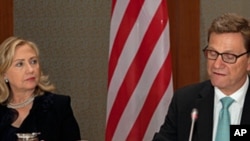As Afghanistan moves closer to assuming full responsibility for its security, “the states of Central and South Asia will play a key role in supporting peace and economic development in the region,” according to U.S. Assistant Secretary of State Robert Blake.
Balancing competing priorities is an important aspect of U.S. policy toward Central Asia, said Assistant Secretary Blake:
“We do not see our engagement with Central Asia as an either-or choice between developing security relationships at the expense of core values like human rights. Progress on one issue can help reinforce, or create incentives for, progress on other issues.”
U.S. involvement in Afghanistan has enhanced cooperation with Central Asian states and opened the door for closer dialogues such as the Annual Bilateral Consultation process. These talks include discussions on a full spectrum of bilateral issues including human rights, religious freedom, science and technology collaboration, economic development, defense cooperation, and other subjects. Central Asian states have also sent representatives to key international conferences on Afghanistan in Istanbul, Turkey, in November and Bonn, Germany, in December. At both of these meetings, Central Asian states reiterated a commitment to work toward integrating the region economically as an important precursor to achieving lasting peace and prosperity.
The New Silk Road concept envisions a network of economic, transit, trade, and people-to-people connections across South and Central Asia that will embed Afghanistan more firmly into its neighborhood.
The U.S. supports this New Silk Road concept through its support for multilateral efforts such as the Asian Development Bank-led Central Asia Regional Economic Cooperation Program or CAREC. By 2020, CAREC will have mobilized $20 billion to improve six corridors that traverse Central Asia. The U.S. hopes that Central Asian countries will continue to work through organizations like CAREC and others to overcome bilateral obstacles, ensure rule of law, eradicate corruption and remove non-tariff barriers to trade.
Through the United Nations and bilateral programs, the U.S. also hopes to help address issues such as narcotics trafficking, global terrorism and trafficking in persons.
The United States continues to look toward a future where the countries of Central Asia work together and with the international community to achieve long-term, meaningful results on regional integration.




